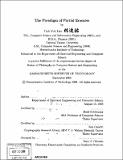The paradigm of partial erasures
Author(s)
Lim, Dah-Yoh, 1978-
DownloadFull printable version (6.638Mb)
Other Contributors
Massachusetts Institute of Technology. Dept. of Electrical Engineering and Computer Science.
Advisor
Shafi Goldwasser and Ran Canetti.
Terms of use
Metadata
Show full item recordAbstract
This thesis is a study of erasures in cryptographic protocols. Erasing old data and keys is an important capability of honest parties in cryptographic protocols. It is useful in many settings, including proactive security in the presence of a mobile adversary, adaptive security in the presence of an adaptive adversary, forward security, and intrusion resilience. Some of these settings, such as achieving proactive security, is provably impossible without some form of erasures. Other settings, such as designing protocols that are secure against adaptive adversaries, are much simpler to achieve when erasures are allowed. Protocols for all these contexts typically assume the ability to perfectly erase information. Unfortunately, as amply demonstrated in the systems literature, perfect erasures are hard to implement in practice. We propose a model of imperfect or partial erasures where erasure instructions are only partially effective and leave almost all the data intact, thus giving the honest parties only a limited capability to dispose old data. Nonetheless, we show how to design protocols for all of the above settings (including proactive security, adaptive security, forward security, and intrusion resilience) for which this weak form of erasures suffices. We do not have to invent entirely new protocols, but rather show how to automatically modify protocols relying on perfect erasures into ones for which partial erasures suffices. Stated most generally, we provide a compiler that transforms any protocol relying on perfect erasures for security into one with the same functionality that remains secure even if the erasures are only partial. The key idea is a new redundant representation of secret data which can still be computed on, and yet is rendered useless when partially erased. We prove that any such compiler must incur a cost in additional storage, and that our compiler is near optimal in terms of its storage overhead. We also give computationally more efficient compilers for a number of special cases: (1) when all the computations on secrets can be done in constant parallel time (NC⁰); (2) for a class of proactive secret sharing protocols where we leave the protocol intact except for changing the representation of the shares of the secret and the instructions that modify the shares (to correspondingly modify the new representation instead).
Description
Thesis (Ph. D.)--Massachusetts Institute of Technology, Dept. of Electrical Engineering and Computer Science, 2008. Includes bibliographical references (p. 137-145).
Date issued
2008Department
Massachusetts Institute of Technology. Department of Electrical Engineering and Computer SciencePublisher
Massachusetts Institute of Technology
Keywords
Electrical Engineering and Computer Science.